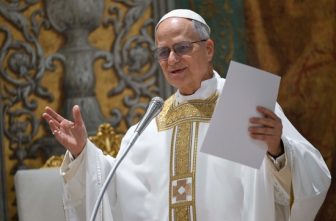
So much of our media and the messages we receive attempt to convince us that everything is relative.
These messages tell us there are no absolutes, there is nothing that we can count on without question, nothing that is completely assured. Many live without hope, believing life is meaningless. As Catholic Christians, these messages can elicit as much anxiety for us as they do for everyone else. However, we know there are absolutes, and it is our responsibility, as the lay apostolate, to speak about this and to live with the belief that this is true.
The late Cardinal Avery Dulles encouraged us to be counter cultural in our beliefs, our words, and our actions, living with the assurance that God is always with us. God’s love for us, his complete commitment to us, and his pledge to be with us through the real presence of his Son in the Eucharist is all we need to stand firmly in the belief that Jesus is really, tangibly present. This is absolute.
As members of the lay apostolate, we learn each week at Mass that, even though the Church has diverse ministries, we have unity of mission. And that mission is to be leaven, or yeast, in a world that is hurting, in a pluralistic society that has accepted the message of relativity.
As Catholic Christians, we are to be joyful and radiate the light we receive from Christ, who is really and truly present to us in the Eucharist. We become members of Christ’s mystical body through our acceptance of this truth and our participation in the Eucharistic meal. We do this in community. There is a seamlessness to the way we live, as we promote our union with him in every aspect of our lives, which draws others to us as they wonder about the source of our joy.
As members of the lay apostolate, we are exhorted to take an active role in the explanation and defense of Christian principles, each according to our talents and abilities. In many ways, we are like the early Christian Church during the apostolic era. We, like the Apostles, are living in a world that is hostile to our beliefs, and perhaps even threatened by our conviction and passion, which should only spur us to supply light in this dark world.
ACTION PLAN
- Read the Vatican II document, the “Decree on the Apostolate of the Laity.”
- Be convinced of the importance of our role in the world.
- Live the faith in small ways each day.
The Vatican II document, “Decree on the Apostolate of the Laity,” or “Apostolicam Actuositatem” states that “the laity have an active part of their own in the life and action of the Church. Their action within the Church communities is so necessary that without it the apostolate of the pastors will frequently be unable to obtain its full effect. … (L)ay persons of a genuinely apostolic spirit supply the needs of their brothers and are a source of consolation no less to the pastors than to the rest of the faithful” (A.A., 10).
Ours is a time for great courage and conviction, not timidity and fear. The Lord needs every one of us to help reclaim this broken world for God. Whether at work, in our neighborhood, or even our own family, we must understand what is being asked of us and then bravely step forward in faith that the Holy Spirit will guide and help us.
The “Apostolate of the Laity” asserts that “the laity accomplish the Church’s mission in the world principally by that blending of conduct and faith which makes them the light of the world” (A.A., 13). What can we do today to live as vibrant members of the lay apostolate? We can radiate our Christian joy, showing that there are absolutes we can rely on, and be leaven in our hurting world.
Soucheray is a licensed marriage and family therapist emeritus and a member of St. Ambrose in Woodbury. Learn more at her website ifhwb.com.




